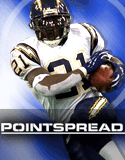NFL Odds | BCS College Football Odds | World Series 2006 Free live Lines | Sports Betting Information | Gambling Information | Casino Games | Poker Gaming | Sports Forum
The Bettors Corner Main Menu
Premium Handicappers
The Bettors Corner Features
The Bettors Corner Tools
PS Network
WebMasters
Casino : The Movie
The "Ace" was up against a Royal Flush in Universal Pictures hit movie Casino*, a true to life portrayal of Frank "Lefty" Rosenthal, played by Hollywood Super Star Robert De Niro.
Learn more about Frank "The Ace" Rosenthal at www.Frank777.com
Sports Betting
Sports betting is the name given to the general activity of predicting sports results, while betting on the believed outcome. Billions of dollars worldwide are involved in this form of gambling.
Perhaps more so than other gambling games, the legality and general acceptance of sports betting varies from nation to nation.
In addition, sports betting is often seen as a threat to the integrity of amateur and professional sport. The ability to fix matches and create a near-certain payoff is sometimes seen as a disincentive to fair play within sports leagues. More Sports Betting
Super Bowl 2007 Football Championships | Football Wagering | NFL Football
Super Bowl XLI 2007 | Super Bowl XL 2006 | Super Bowl History | NFL Standings | NFL Team Stats | NFL General Stats | Super Bowl MVPs | Super Bowl Scores | Super Bowl Venue | Super Bowl Ratings | Super Bowl Entertainment
Super Bowl History
Super Bowl Origins
The Super Bowl was created as part of the merger agreement between the National Football League (NFL) and its rival, the American Football League (AFL). After its inception in 1920, the NFL fended off several rival leagues before the AFL began play in 1960. The intense competitive war for players and fans led to serious merger talks between the two leagues in 1966 (See AFL-NFL Merger for more information).
 One of the conditions of the agreement was that the winners of each league's championship game would meet in a contest to determine the so-called world champion of football. During the discussions to iron out the details, AFL founder and Kansas City Chiefs owner Lamar Hunt had jokingly referred to the proposed interleague championship as the "Super Bowl." Hunt thought of the name after seeing his daughter playing with a toy called a Super Ball. The ball is now on display at the Pro Football Hall of Fame in Canton, Ohio. The name was feasible because postseason college football games had long been known as "bowl games" (The term originates with the Rose Bowl game, which was in turn named for the bowl-shaped stadium in which it is played). Hunt only meant his suggested name to be a stopgap until a better one could be found. Not having thought of one, the owners named the contest the NFL-AFL World Championship Game. Unsurprisingly, fans and media tended to use the shorter, unofficial name. Starting with the third contest in 1969, the name "Super Bowl" became official.
One of the conditions of the agreement was that the winners of each league's championship game would meet in a contest to determine the so-called world champion of football. During the discussions to iron out the details, AFL founder and Kansas City Chiefs owner Lamar Hunt had jokingly referred to the proposed interleague championship as the "Super Bowl." Hunt thought of the name after seeing his daughter playing with a toy called a Super Ball. The ball is now on display at the Pro Football Hall of Fame in Canton, Ohio. The name was feasible because postseason college football games had long been known as "bowl games" (The term originates with the Rose Bowl game, which was in turn named for the bowl-shaped stadium in which it is played). Hunt only meant his suggested name to be a stopgap until a better one could be found. Not having thought of one, the owners named the contest the NFL-AFL World Championship Game. Unsurprisingly, fans and media tended to use the shorter, unofficial name. Starting with the third contest in 1969, the name "Super Bowl" became official.
After the NFL's Green Bay Packers won the first two Super Bowls in convincing victories, some team owners feared for the future of the merger, since many doubted that AFL teams could compete with their NFL counterparts. However, in one of the biggest upsets in American sports history, the AFL's New York Jets defeated the Baltimore Colts in Super Bowl III. One year later, the Chiefs won Super Bowl IV.
When both the NFL and the AFL merged into one combined league before the 1970 season, three NFL teams joined the 10 AFL teams to form the American Football Conference (AFC), and the other 13 teams became the National Football Conference (NFC). Since then, the Super Bowl has featured the champions of the AFC and NFC. As of 2005, former AFL teams have won 10 Super Bowls, pre-1970 NFL teams have won 23 games, and two games have been won by teams created after 1970.
The winning team receives the Vince Lombardi Trophy, named for the coach of the Green Bay Packers, who won the first two Super Bowl games. The trophy was named the Vince Lombardi Trophy prior to Super Bowl V in his honor following his death in 1970.
Big Ben
At 24, Ben Roethlisberger’s first job is an NFL quarterback, already has his first Super Bowl ring and probably will never see another TV dinner the rest of his life.
Roethlisberger lost his first game as a backup, but it only ended up being a hiccup in what turned out to be a record setting season by Big Ben and the Steelers. Roethlisberger went on to set the NFL record for wins by a rookie QB with 13.He led Pittsburgh to a 15-1 record (although he didn’t play in the season finale against Buffalo) and all the way to AFC Championship game, before finally meeting his match against the eventual Super Bowl Champion New England Patriots.
In 2005, he made history again by being the only rookie to start in two Conference Championship games in his first two seasons by leading the Steelers past the Denver Broncos on their way to Super Bowl XL in Detroit.
By beating the Bengals, Colts and Broncos, the Steelers became the first team in NFL history to be a Wild Card team to make it to the Super Bowl. Their run didn’t end on a sour note either.Against the Seattle Seahawks in Super Bow XL, Roethlisberger was less than impressive with a 9 for 21 performance, but he did score on a rushing touchdown to help the Steelers to a 21-10 title victory.
Big Ben’s biggest play wasn’t in the Super Bowl, however. In the Divisional Round matchup with the Indianapolis Colts, Roethlisberger was leading the Steelers to a game clinching touchdown when running back Jerome Bettis fumbled the ball on the goal line with less than 3 minutes left on the clock.When Colts’ defensive back Nick Harper scooped up the ball and started streaking down field, Roethlisberger twisted and turned while back peddling down the field as a safety net.
He eventually tripped up Harper right before midfield and the Steelers were able to hang on to a victory, aided by an Indianapolis missed field goal and poor clock management.
Super Bowl - Game History
Notable Super Bowl Games |
|
Super Bowl III: Speaking to the press in the week before the game, New York Jets quarterback "Broadway" Joe Namath famously guarantees a victory over the heavily favored Baltimore Colts. The Jets defense backs him up as they upset the Colts, 16-7. |
Super Bowl III was the third AFL-NFL Championship Game in professional American football, but the first to officially bear the name "Super Bowl" (The two previous AFL-NFL Championship Games would retroactively be called "Super Bowls" as well). The game was played on January 12, 1969 at the Orange Bowl in Miami, Florida. The American Football League (AFL) champion New York Jets defeated the National Football League (NFL) champion Baltimore Colts, 16–7, in the first Super Bowl victory for the AFL. Jets quarterback Joe Namath, who completed 17 out of 28 passes for 206 yards, was named the Super Bowl's Most Valuable Player. This game is regarded as one of the biggest upsets in American sports history. The National Football League champion Colts were heavily favored (in some books, by over 20 points) to defeat the American Football League champion Jets. Although the upstart AFL had successfully forced the long-established NFL into a merger agreement three years earlier, the AFL was not generally respected as having the same calibre of talent as the NFL. Plus, the AFL representatives were heavily defeated in the first two Super Bowls. |
Super Bowl VII: Coach Don Shula and the Miami Dolphins complete the only undefeated season in NFL history, defeating the Washington Redskins 14-7. |
Super Bowl VII was the 7th Super Bowl, the championship game of the National Football League (NFL). The game was played on January 14, 1973 at the Los Angeles Memorial Coliseum in Los Angeles, California following the 1972 regular season. The American Football Conference (AFC) champion Miami Dolphins defeated the National Football Conference (NFC) champion Washington Redskins, 14–7, and became the first (and only) team in the NFL to complete a perfect, undefeated season. Dolphins Safety Jake Scott, who made 2 interceptions, including one in the end zone during the 4th quarter, and another return for 55 yards, was named Most Valuable Player. He became the second defensive player in Super Bowl history (after Linebacker Chuck Howley in Super Bowl V) to earn a Super Bowl MVP. Super Bowl VII was broadcast on NBC in the United States with Curt Gowdy and Al DeRogatis. While the Coliseum was sold out for the game, unconditional blackout rules in the NFL prohibited the live telecast from being shown in the Los Angeles area. |
Super Bowl XIII: The Pittsburgh Steelers defeat the Dallas Cowboys 35-31 in the second Super Bowl matchup of these 1970's powerhouses. |
Super Bowl XIII was the 13th Super Bowl, the championship game of the National Football League (NFL). The game was played on January 21, 1979 at the Orange Bowl in Miami, Florida following the 1978 regular season. The American Football Conference (AFC) champion Pittsburgh Steelers defeated the National Football Conference (NFC) champion Dallas Cowboys, 35–31. It was the first ever Super Bowl rematch. The Steelers previously beat the Cowboys in Super Bowl X, 21–17. Steelers quarterback Terry Bradshaw was named Super Bowl MVP. Bradshaw, who completing 17 out of 30 passes, broke Super Bowl records for the most passing yards in a game (318) and the most touchdown passes in a game (4). Also, his 75-yard touchdown pass in the second quarter tied Johnny Unitas in Super Bowl V for the longest in a Super Bowl. The game was broadcast on NBC in the United States with Curt Gowdy, Merlin Olsen and John Brodie. |
Super Bowl XXIII: San Francisco 49ers quarterback Joe Montana leads a 92 yard fourth quarter drive, as the 49ers score the game-winning touchdown with 34 seconds left and defeat the Cincinnati Bengals 20-16. |
Super Bowl XXIII was the 23rd Super Bowl, the championship game of the National Football League (NFL). The game was played on January 22, 1989 at Joe Robbie Stadium in Miami, Florida following the 1988 regular season. The National Football Conference (NFC) champion San Francisco 49ers defeated the American Football Conference (AFC) champion Cincinnati Bengals, 20–16. This was the second meeting between the two teams in the Super Bowl; they first met seven years earlier in Super Bowl XVI. The game is remembered for the 49ers' come back from a 16-13 deficit. The 49ers got the ball on their own eight yard line with 3:10 on the clock, and marched 92 yards down the field in under three minutes. They took the lead on a Joe Montana pass to John Taylor with just 34 seconds left in the game, and went on to win. This was the drive in which, to break tension, Montana looked into the stands and pointed, saying "Isn't that John Candy?" After the game, 49ers wide receiver Jerry Rice was named the Super Bowl MVP, catching 11 passes for a Super Bowl record 215 yards and one touchdown. This was also the final NFL game coached by the 49ers' Bill Walsh. NBC televised the game in the United States, with announcers Dick Enberg and Merlin Olsen. |
Super Bowl XXIV: The San Francisco 49ers defeat the Denver Broncos 55-10, the largest margin of victory in Super Bowl history. |
Super Bowl XXIV was the 24th Super Bowl, the championship game of the National Football League (NFL). The game was played on January 28, 1990 at the Louisiana Superdome in New Orleans, Louisiana following the 1989 regular season. The National Football Conference (NFC) champion San Francisco 49ers defeated the American Football Conference (AFC) champion Denver Broncos, 55–10. It remains the most lopsided game in Super Bowl history to date. The 49ers' 55 points were the most ever scored by one team, as was their 45-point margin of victory. Joe Montana was named the Super Bowl MVP, his third award in his fourth Super Bowl victory. He completed 22 of 29 passes for a total of 297 yards and 5 touchdowns, and rushed for 15 yards. Jerry Rice caught 3 of those touchdown passes. Head coach George Seifert was the second rookie head coach to win a Super Bowl. The game was telecast in the United States by CBS. Pat Summerall and John Madden called the game. |
Super Bowl XXV: As time expires, the Buffalo Bills' Scott Norwood attempts a 47-yard field goal but misses wide to the right, and the New York Giants win 20-19. A tightly contested game with no turnovers by either team, it remains the only game to be decided by a single point. |
Super Bowl XXV was the 25th Super Bowl, the championship game of the National Football League (NFL). The game was played on January 27, 1991 at Tampa Stadium in Tampa, Florida following the 1990 regular season. The National Football Conference (NFC) champion New York Giants defeated the American Football Conference (AFC) champion Buffalo Bills, 20–19. The Giants won their second Super Bowl, while the Bills would begin a dubious streak of four straight Super Bowl losses. Giants running back Ottis Anderson, who carried the ball 21 times for a total of 102 yards and one touchdown, was named Super Bowl MVP. Anderson also recorded one reception for 7 yards. Super Bowl XXV was played under much patriotic fervor, due to the then-current Gulf War. The rousing rendition of the Star Spangled Banner, sung by Whitney Houston, exemplified the rage for anything red, white, and blue at the time. However, the game is best remembered for Bills placekicker Scott Norwood's 47-yard missed field goal attempt in the waning seconds of the game. ABC televised the game in the United States, with announcers Al Michaels, Dan Dierdorf, and Frank Gifford. The television network did not broadcast the halftime show featuring New Kids on the Block live. Instead, they televised a special ABC News report anchored by Peter Jennings on the progress of the war. The halftime show was later shown on tape delay after the game. |
Super Bowl XXXII: After four painful losses, the Denver Broncos finally win a title, upsetting the heavily favored, defending champion Green Bay Packers 31-24 and becoming the first AFC Super Bowl champion in 14 years. |
Super Bowl XXXII was the 32nd Super Bowl, the championship game of the National Football League (NFL). The game was played on January 25, 1998 at Jack Murphy Stadium in San Diego, California following the 1997 regular season. The American Football Conference (AFC) champion Denver Broncos defeated the National Football Conference (NFC) champion Green Bay Packers, 31–24. It was a game that many fans agree was one of the most exciting Super Bowls in the past decade. Even though the defending Super Bowl champion Packers were heavy favorites going into the game, the Broncos won their first Vince Lombardi Trophy after suffering 4 frustrating Super Bowl losses, and snapped a 13-game losing streak for AFC teams in the Super Bowl. The win was especially satisfying for Denver's 37-year old quarterback John Elway, who had been the starting quarterback for the Broncos in 3 Super Bowl losses in a span of 4 years. Denver running back Terrell Davis, who ran for 157 yards and scored a Super Bowl record three rushing touchdowns, was named Super Bowl MVP. |
Super Bowl XXXIV: In an incredibly close finish, Tennessee Titans wide receiver Kevin Dyson catches a short pass but is stopped at the 1 yard line as he stretches for the end zone with no time left on the clock, and the St. Louis Rams hold on to win 23-16. |
Super Bowl XXXIV was the 34th Super Bowl, the championship game of the National Football League (NFL). The game was played on January 30, 2000 at the Georgia Dome in Atlanta, Georgia following the 1999 regular season. The National Football Conference (NFC) champion St. Louis Rams defeated the American Football Conference (AFC) champion Tennessee Titans, 23–16. This was the Rams' first Super Bowl win and their first NFL championship since 1951. Rams quarterback Kurt Warner, who broke the Super Bowl record with the most passing yards in a game (414) and threw for 2 touchdowns, was named Super Bowl MVP. |
Super Bowl XXXVI: Placekicker Adam Vinatieri kicks a 48-yard field goal as time expires to lift the New England Patriots to a 20-17 upset over the Rams, and the first of 3 Super Bowl wins over a 4 year span. 2 years later, Vinatieri would kick another game-winning field goal at the end of Super Bowl XXXVIII |
Super Bowl XXXVI was the 36th Super Bowl, the championship game of the National Football League (NFL). The game was played on February 3, 2002 at the Louisiana Superdome in New Orleans, Louisiana following the 2001 regular season. The American Football Conference (AFC) champion New England Patriots defeated the National Football Conference (NFC) champion St. Louis Rams, 20–17. Patriots Quarterback Tom Brady, who completed 16 of 27 passes for 145 yards and a touchdown, was named Super Bowl MVP. The game was originally scheduled for January 27, but the September 11, 2001 attacks led to the NFL schedule being moved one week back. Because of the attacks, Homeland Security has designated each subsequent Super Bowl a National Special Security Event (NSSE). |
Visit Super Bowl 2007 Football Championships - Official Website at /
The Columnists
Professional Cappers Challenge
Igor Schumacher
Marla Hoom
Paula Bryan
Jennifer O'neal
Upcoming Sports Events
BCS - Bowl Championship
Series (College Football) Dec 20 thru Jan 4, 2006
Australian Open Tennis (Tennis) Australia, January 2006
Super Bowl XLI 2007 (Football) February 6, 2007
FIFA World Cup (Soccer) Germany, 2006
2005 Sports Events
Breeder's Cup (Horse Racing) October, 2005
MLB World Series - NLCS - ALCS - (MLB Baseball) October, 2005
US Open Championships (ATP-WTA Tennis) Aug 29 - Sept 11, 2005
Tour de France (Bicycling) July 2-24 2005
British Open (PGA Golf) July 14 - July 17, 2005
Wimbledon (ATP-WTA Tennis) June 20 - July 3, 2005
US Open (PGA Golf) June 16 - 19, 2005
Belmont Stakes (Horse Racing) June 11, 2005
Roland Garros (ATP-WTA Tennis) May 23 - June 5, 2005
Preakness Steakes (Horse Racing) May 21, 2005
Kentucky Derby (Horse Racing) May 7, 2005
The Masters Tournament (PGA GOLF) April 4-10, 2005
Indianapolis 500 (Motor Racing) May, 2005
Dubai World Cup (Horse Racing) March 26, 2005
Daytona 500 (Motor Racing) February, 2005












